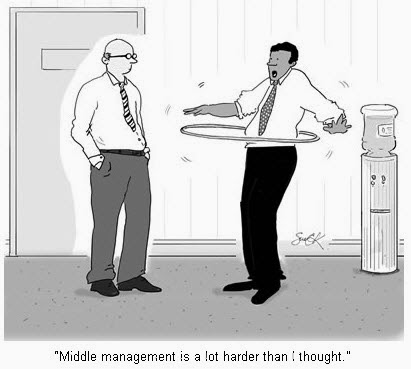Tag: paradox
Defer or Initiate?: Tips from the MIddle
Many leaders find themselves in the middle of an organization. Depending on your past experiences, this can be a challenging place to operate. You are not the boss, but you also aren’t just taking orders. You are expected to lead the team of people you are responsible for in the right direction, while also being mindful of the guidance and direction set for the organization at the top.
In many organizations, this requires finding a unique balance:
- When you look to the leadership of the organization, you are expected to defer. Simply, this means not focus on your own preferences, but work toward the goals which have been set for you. This requires less creativity, but can still be challenging if you would prefer to be driving on your own. The way you honor and serve those ahead of you in the organization will set an example for your team; watch this carefully.
- When you look to the members of your team, you are expected to initiate. You will rarely get 100% of the guidance for operating your sphere from the leadership ahead of you. If they had capacity to do that, they wouldn’t need you in the role you’re in. So you must identify strategies, create systems, and lead the team forward. You can’t wait for everything to work out and hand itself to you in a package with a bow. Solving challenges is why you were hired, and that means studying the situation, praying for wisdom, and experimenting with possible solutions in dialogue and in implementation.
Limited Capacity for Relationships? You might be surprised
A while back, I heard a principle which was referred to as Dunbar’s Law. Dunbar is an anthropologist who suggests that each individual can generally maintain approximately 150 relationships at any given time. Often if you make new friends in a new job or church, it becomes hard to stay “as current” with the friends who you no longer connect with on a regular basis. Some have a surprising capacity to do more than this; some less. But I’ve found it to be really true, at least in that there are limits to how many relationships you can legitimately sustain. This is why the friends who were close in one life stage often grow apart later in life. How often do you see or talk to your college roommate?
When I was the Children’s Pastor at our church, I was able to maintain good working knowledge of the majority of our kids and volunteers. Many were from the same family so that helped. As I transitioned into a new role, though, I began building relationships with volunteers in many other spheres. All of the sudden, I couldn’t keep up with all of the children’s workers and families as well. I deeply missed some of those relationships, but my capacity was focused elsewhere.
How do you keep up with key relationships?
I think it’s important for everyone to be aware that there are limitations to our capacity for meaningful relationships. When you’re in an industry that values meeting and engaging lots of new people on a regular basis, I have found that I have to:
- choose carefully into which relationships I’m going to invest lots of energy and time. Filling your life with new people, faces, and relationships all the time could use up your capacity. Make sure to prioritize the key relationships in your life: close family and friends, etc. You can’t use this as an excuse to keep others at arm’s length, but it is important to guard your key relationships. Be willing to be honest with yourself that you can’t be everyone’s “best friend”. You may recognize this need in their lives, but that doesn’t mean you can fill it.
- use notes, to-do lists, and calendars to keep up with happenings in people’s lives who I want to care for, but may not have the capacity to remember. Simple birthday texts, or “I’m praying for you because I know you have surgery tomorrow” can go a long way to showing care and just require that you make note of these things when they come up.
Side note: Some say that if you really cared, you would work to remember all of these things. I contend that I care enough to recognize that I will have trouble remembering everything. I manage that personal weakness by writing things down. Then I can show that care when the timing is appropriate.
A pastoral example
A pastor I respect greatly shared during a message that there were 12 important men in his life. He has given himself to them as friends and as a mentor. These men are the key leaders in his church and he shared that he was committed to taking their calls and being available to them. Beyond his family, he admitted that he couldn’t maintain that same availability to everyone, especially in his very large church.
Are you minding your capacity for deep relationships?
Recommended link: Unlimited Availability?


